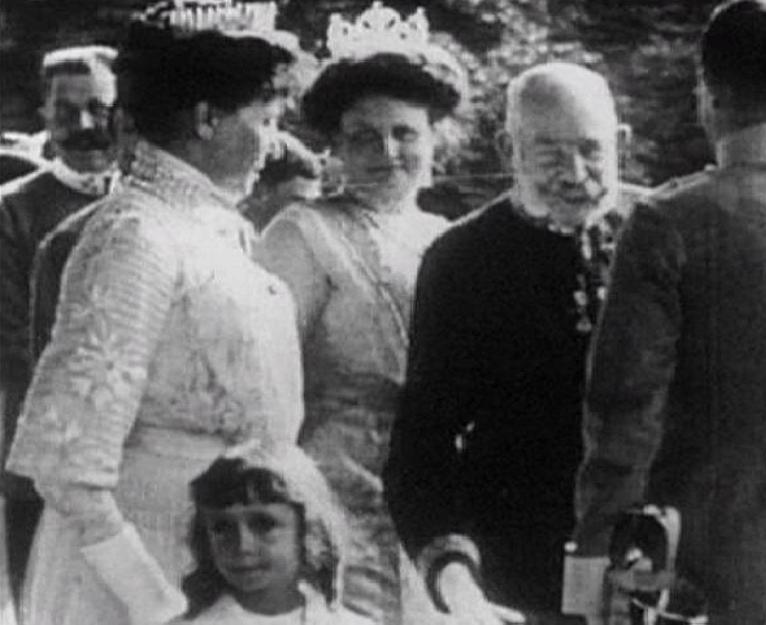

Emperor Franz Josef: Later Years

Figure 1.--Here we see Emperor Franz Josef about 1913. By this time he Emperor rarely left the Palace and left state affairs lsargely in the hands of his adviseres. We are not sure who the other individuals, including child in the photograph are. We are not even sure if the child is a boy or girl. It may be Prince Otto who wore dresses as a boy. The Emperor was his great uncle. It may be Franz Ferdinand in the background. The women may be his daughters.
|
|
The later years of Emperor Franz Josef were marked by a series of family tragedies and policy failures. His only son and heir, Archduke Rudolf, committed suicide at Mayerling in one of the great love stories of the 19h century (1889). As his daughters could not inherit the throne, the sucessioi passed to his second younger brother, Karl Ludwig. (His first younger brother had died in Mexico.) Karl Ludwif then tragically died after drinking bad water while on a pilgrimage in the Holy Lands (1896).MMext an Italian anarchist assasinated the Emperess Elizabeth in Geneva (1898). In addition to the personal tragedies, there was a critical policy failure. After reaching a compromise with the Hungarias ad becoming a dual monarch, Franz Josef realized that there would have to be constitutional changes to accomodate the Empire's Slavic nationalitices (Croats, Czechs, Serbs, Slovaks, Slovenes, and Serbs). Ther Emperor announced his intention of granting a degree of self-government to the Slavic nationalities. This proved difficult to achieve in practice. Such a step was opposed by the German and Magyar (Hungarian) politicians who essentially ran the Empire and who fundamentally opposed to any form of power-sharing. This would have ultimately led to land reform which would have undermined their economic interests. This was not only a domestic problem, but had international implications as a result of Tsarist Russia's Pan-Slavic foreign policy. While the Emperor wanted a degree of condtitutional reform, military reverses to Prussia, France, and Austria had trandsformed Austria to a largely Balkan-Central European power. The Emperor fully realized what had occurred during his reign and was opposed to any further territorial concessions. As the borders with Germany ad Russia were fixed, this setermination primarily afected the borders in the Balkans with Serbia. After the Emperess's assasination, the aging Emperor began to withdraw from public life. Hecappears to have never fully recovered from the loss. The future Empress-Consort Zita of Bourbon-Parma, reports that he would often comment to family members, "You'll never know how important she was for me". Other sources reported he would say, "She will never know how much I loved her." And increasingly left the handling of state issues to his advisers who were unwilling to seriously address the nationalities issue. Gradually the Emperor more and more lived his life in the palace. The Emperor's last significant personal intervention concerned the sucession. After Archduk Karl Ludwig's death, his eldest son, Franz Ferdinand, emerged as heir. The problem here was that the Emperor did not like Franz Ferdinand. Here there were both personal and policy issues involved which are difficult to seperate. And this climaxed when Franz Ferdinand chose to marry Sophie Chotek von Chotkova. The Emperor saw her as unacceptably below his nephew's rank. Sophie came from a noble Bohemian family. The Emperor wanted a member of the Hapsburg royal family or from one of the ruling Catholic dynasties of Europe which primarily meant German. The Emperor only permitted the marriage when Franz Ferdinand agreed to renounce all rights of sucession for his children (1899). Especially gualing to the Archduke, Sophie was not permitted to accompany her husband in the royal carriage nor could she sit by his side in the royal box. Negotiations over this engendered extremely rancouros dicussions and were only agreed to after Kaiser Wilhelm II, Tsar Nicholas II, and Pope Leo XIII all interveed. Emperor Franz Jodef refused to attended the marriage cerempny. (He would also years later even refuse to attend Franz Ferdinand's funeral.) Despite the teritoirial losses and failure to resolve the nationalities issues, the aging Emperor was immensely popular among his subjects, including the various nationalities. This is perhaps in part to a relatively high standard of living prevalent throughout the Empire, although some Slavic groups like the Slovaks were economically disadvantaged. His final mahor decesion was to declare war on Serbia following the assasination of Archduke Franz Ferdinand (1914). Here he acted on the advice of Foreign Minister Leopold von Berchtold. The Empire issued an ultimatum which Serbia largely accepted. The Emperor left the conduct of the war entirely to his military high command.
HBRC

Navigate the Boys' Historical Clothing Web Site royal pages:
[Return to the Main Franz Josef page]
[Return to the Main Austria pages]
[Baden]
[Bavaria]
[Belgium]
[France]
[German states]
[German Empire]
[Italy]
[Monaco]
[Netherlands]
[Norway]
[Romania]
[Russia]
[Spain]
[United Kingdom]
[Main royal pages]
Created: 1:32 AM 11/20/2009
Last updated: 1:32 AM 11/20/2009




